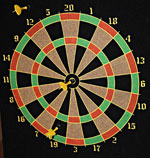How Do You Ground Your Training?
Sharing the Principles and Processes of Preparing Educators for Online Writing Instruction
References
Allen, I. Elaine and Jeff Seaman. Entering the Mainstream: The Quality and Extent of Online Education in the United States, 2003 and 2004. The Sloan Consortium, 2004.
Apps, Jerold W. "Mastering the Teaching of Adults." Malabar, FL: Krieger Publishing Company, 1991.
Barkley, Steve, and Bianco, Terri. "Learning Experts Examine Shortfalls in On-site and On-line Training." Performance Improvement 40.5 (May–June 2001), 13–15.
Beason, Larry. "Preparing Future Teachers of English to Use the Web: Balancing the Technical with the Pedagogical." In Sibylle Gruber, Ed., Weaving a Virtual Web: Practical Approaches to New Information Technologies. Urbana, IL: NCTE, 2000. 25-42.
Boehle, Sarah. “My Exasperating Life as an Online Learner.” Training 37.6 (June 2000): 64–68.
Boehle, Sarah, Kevin Dobbs, and David Stamps. “Optimism Meets Skepticism: Two Views of Distance Learning.” Training 37.6 (June 2000): 34.
Blair, Kristine L., and Elizabeth A. Monske. “Cui Bono? Revisiting the Promises and Perils of Online Learning.” Computers and Composition 20.4 (Dec. 2003): 441–53.
Blythe, Stuart. “Designing Online Courses: User-Centered Practices.” Computers and Composition 18.4 (Dec. 2001): 329–46.
Brown, Deb and Elias, David. "The Technological Professionalization of Preservice Secondary Education Teachers." Kairos: Rhetoric, Technology, Pedagogy 6.1 (2001) http://english.ttu.edu/kairos/6.2/binder2.html?coverweb/k16/brownelias/index.htm
Buber, Martin. I and Thou. 1923. Walter Kaufmann, trans. New York: Scribner, 1970.
Cargile Cook, Kelli and Keith Grant-Davie, Eds. Online Education: Global Questions, Local Answers. Baywood: Baywood Publishing Co, 2005.
Cheville, Julie. “Automated Scoring Technologies and the Rising Influence of Error.” English Journal 93.4 (March 2004): 47-52.
Davis, Evan, and Hardy, Sarah. "Teaching Writing in the Space of Blackboard." Computers and Composition Online. 2003. http://www.bgsu.edu/cconline/DavisHardy/index.html. Accessed January 6, 2005.
De Leeuwe, Marcel. (2004). "E-Learning Site.com." www.e-learningsite.com. Accessed April 1, 2004.
Driscoll, Margeret and Reid, John E. "Web-Based Training: An Overview of Training Tools for the Technical Writing Industry." Technical Communication Quarterly 8.1 (Winter, 1999): 73-86.
Dufflemeyer, Barbara Blakely. "Learning to Learn: New TA Preparation in Computer Pedagogy." Computers and Composition 20.3 (September 2003): 295-311.
Ehmann, Christa. “Exploring New Territory: Developing a Research Agenda for Online Tutoring and Instruction.” Journal of the National Tutoring Association - Inaugural Edition (Spring 2001): 69-86.
Ehmann Powers, Christa. “An Empirical Investigation of Online Writing Instruction and Faculty Attitudes: Influences on Theory and Practice” Manuscript 2005.
Ehmann, Christa and Beth L. Hewett. "Designing a Principles-based Online Training Program for Instructors." Distance Learning (USDLA). Spring 2005
Elliott, John. Action Research for Educational Change. Philadelphia: Open UP, 1991.
Eldred, Janet Carey, and Lisa Toner. “Technology as Teacher: Augmenting (Transforming) Writing Instruction.” In Takayoshi and Huot, Eds. Teaching Writing with Computers: An Introduction. Boston: Houghton, 2003. 33–54.
Faigley, Lester. "Beyond Imagination: The Internet and Global Digital Literacy." In Gail Hawisher and Cynthia Selfe, Eds., Passions, Pedagogies, and Twenty-First-Century Technologies. Logan: Utah State UP, 1999. 129-139.
Flood, Jim. (2002). "Accrediting E-Learning." http://www.corous.com/resources/02.cfm. Accessed November 25, 2004.
Galbraith, Michael W. “The Adult Learning Transactional Process.” Facilitating Adult Learning: A Transactional Process. Ed. Galbraith. Malabar, FL: Krieger, 1991: 1–32.
Galbraith, Michael W., and Bonnie S. Zelenak. “Adult Learning Methods and Techniques.” Facilitating Adult Learning: A Transactional Process. Ed. Michael W. Galbraith. Malabar, FL: Krieger, 1991: 103–33.
Grady, Helen M. and Marjorie T. Davis. "Teaching Well Online with Instructional and Procedural Scaffolding." Online Education: Global Questions, Local Answers. Kelli Cargile Cook and Keith Grant-Davie, Eds. Baywood: Baywood Publishing Co, 2005. 101-122.
Greene, Cheryl, Teryl Sands-Herz, Zach Waggoner, and Patricia Webb. "Writing Classes in the Virtual Age: Graduate Students and Professors as Co-Conspirators." Kairos: Rhetoric, Technology, Pedagogy, 7.2, (2002). http://english.ttu.edu/kairos/7.3/binder2.html?coverweb/greene/index.html
Hewett, Beth L. “Asynchronous Online Instructional Commentary: A Study of Student Revision.” Readerly/Writerly Texts. August 2005.
Hewett, Beth L. “Generating New Theory for Online Writing Instruction (OWI).” Kairos: A Journal of Rhetoric, Technology, and Pedagogy. 6.1 (Fall 2001). http://english.ttu.edu/kairos/6.2/binder.html?features/hewett/index.html
Hewett, Beth L. “Synchronous Online Conference-Based Instruction: A Study of Whiteboard Interactions and Student Writing.” Computers and Composition. Forthcoming Spring 2006.
Hewett, Beth L. and Christa Ehmann. Preparing Educators for Online Writing Instruction: Principles and Processes. Urbana, IL: NCTE, 2004.
Holian, Rosalie. “Paper 3: Doing Research in My Own Organisation: Ethical Dilemmas, Hopes and Triumphs.” Action Research International 1999. 18 June 2002 http://www.scu.edu.au/schools/gcm/ar/ari/p-rholian99.html.
Knowles, Malcolm. The Adult Learner: A Neglected Species. 4th ed. Houston: Gulf, 1990.
Kiser, Kim. “Ten Things We Know So Far about Online Training.” Training 36.11 (Nov. 1999): 66–74.
Moran, John V., and Allerton, Haidee E. Top Ten E-learning Myths. Training and Development, (September 2000): 32-33.
Renwick, Kerry. “Learning to Learn Online: Box Hill Learning Network.” Research to Reality: Putting VET Research to Work. Proc. of the Australian Vocational Education and Training Research Association (AVETRA) Conference, March 2001.
Rude, Carolyn. "Strategic Planning for Online Education: Sustaining Students, Faculty, and Programs." Online Education: Global Questions, Local Answers. Kelli Cargile Cook and Keith Grant-Davie, Eds. Baywood: Baywood Publishing Co, 2005. 67-85.
Salmon, Gilly. "Changing Learning Environments." Keynote Lecture to ALT 2001. Edinburgh, Scotland. (September 2001).
Schön, Donald. “Educating the Reflective Practitioner” Meeting of the American Educational Research Association. Washington, DC, 1987. 18 June 2002 http://educ.queensu.ca/~russellt/howteach/schon87.htm.
Schwandt, Thomas. Qualitative Inquiry: A Dictionary of Terms. London: Sage, 1997.
Smith, Beatrice Quarshie. "Teaching with Technologies: A Reflexive Auto-Ethnographic Portrait." Computers and Composition, 21.1 (March 2004): 49-62.
Stockley, Derek. (2004). "HRD and Performance Consulting." http://www.derekstockley.com.au. Accessed April 1, 2004.
Takayoshi, Pamela, and Brian Huot, Eds. Teaching Writing with Computers: An Introduction. Boston: Houghton, 2003.
Twigg, Carol. "Improving Learning and Reducing Costs: New Models for Online Learning." Educause (September/October 2003): 29-39.
Walker, Cynthia L. "So You've Decided to Develop a Distance Education Class...." Kairos: Rhetoric, Technology, Pedagogy, 6.2 (2001). http://english.ttu.edu/kairos/6.2/binder2.html?coverweb/de/walker/index.htm
